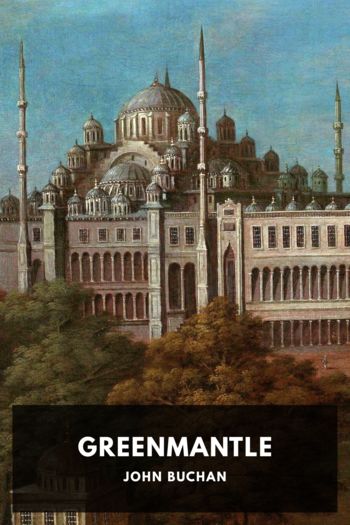Greenmantle - John Buchan (free ebook reader for iphone .TXT) 📗

- Author: John Buchan
Book online «Greenmantle - John Buchan (free ebook reader for iphone .TXT) 📗». Author John Buchan
I stood as stiff as a ramrod and saluted. I was perfectly cool and most desperately interested. For such a moment I would have gone through fire and water.
“Majesty, this is the Dutchman I spoke of,” I heard Stumm say.
“What language does he speak?” the Emperor asked.
“Dutch,” was the reply; “but being a South African he also speaks English.”
A spasm of pain seemed to flit over the face before me. Then he addressed me in English.
“You have come from a land which will yet be our ally to offer your sword to our service? I accept the gift and hail it as a good omen. I would have given your race its freedom, but there were fools and traitors among you who misjudged me. But that freedom I shall yet give you in spite of yourselves. Are there many like you in your country?”
“There are thousands, sire,” I said, lying cheerfully. “I am one of many who think that my race’s life lies in your victory. And I think that that victory must be won not in Europe alone. In South Africa for the moment there is no chance, so we look to other parts of the continent. You will win in Europe. You have won in the East, and it now remains to strike the English where they cannot fend the blow. If we take Uganda, Egypt will fall. By your permission I go there to make trouble for your enemies.”
A flicker of a smile passed over the worn face. It was the face of one who slept little and whose thoughts rode him like a nightmare. “That is well,” he said. “Some Englishman once said that he would call in the New World to redress the balance of the Old. We Germans will summon the whole earth to suppress the infamies of England. Serve us well, and you will not be forgotten.”
Then he suddenly asked: “Did you fight in the last South African War?”
“Yes, Sir,” I said. “I was in the commando of that Smuts who has now been bought by England.”
“What were your countrymen’s losses?” he asked eagerly.
I did not know, but I hazarded a guess. “In the field some twenty thousand. But many more by sickness and in the accursed prison-camps of the English.”
Again a spasm of pain crossed his face.
“Twenty thousand,” he repeated huskily. “A mere handful. Today we lose as many in a skirmish in the Polish marshes.”
Then he broke out fiercely.
“I did not seek the war … It was forced on me … I laboured for peace … The blood of millions is on the heads of England and Russia, but England most of all. God will yet avenge it. He that takes the sword will perish by the sword. Mine was forced from the scabbard in self-defence, and I am guiltless. Do they know that among your people?”
“All the world knows it, sire,” I said.
He gave his hand to Stumm and turned away. The last I saw of him was a figure moving like a sleepwalker, with no spring in his step, amid his tall suite. I felt that I was looking on at a far bigger tragedy than any I had seen in action. Here was one that had loosed Hell, and the furies of Hell had got hold of him. He was no common man, for in his presence I felt an attraction which was not merely the mastery of one used to command. That would not have impressed me, for I had never owned a master. But here was a human being who, unlike Stumm and his kind, had the power of laying himself alongside other men. That was the irony of it. Stumm would not have cared a tinker’s curse for all the massacres in history. But this man, the chief of a nation of Stumms, paid the price in war for the gifts that had made him successful in peace. He had imagination and nerves, and the one was white hot and the others were quivering. I would not have been in his shoes for the throne of the Universe …
All afternoon we sped southward, mostly in a country of hills and wooded valleys. Stumm, for him, was very pleasant. His imperial master must have been gracious to him, and he passed a bit of it on to me. But he was anxious to see that I had got the right impression.
“The All-Highest is merciful, as I told you,” he said.
I agreed with him.
“Mercy is the prerogative of kings,” he said sententiously, “but for us lesser folks it is a trimming we can well do without.”
I nodded my approval.
“I am not merciful,” he went on, as if I needed telling that. “If any man stands in my way I trample the life out of him. That is the German fashion. That is what has made us great. We do not make war with lavender gloves and fine phrases, but with hard steel and hard brains. We Germans will cure the greensickness of the world. The nations rise against us. Pouf! They are soft flesh, and flesh cannot resist iron. The shining ploughshare will cut its way through acres of mud.”
I hastened to add that these were also my opinions.
“What the hell do your opinions matter? You are a thickheaded boor of the veld … Not but what,” he added, “there is metal in you slow Dutchmen once we Germans have had the forging of it!”
The winter evening closed in, and I saw that we had come out of the hills and





Comments (0)